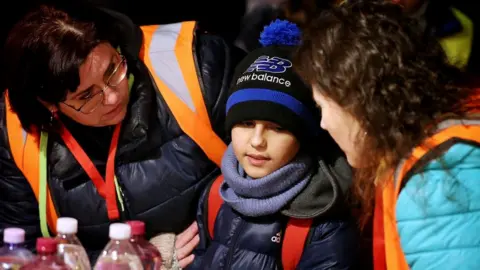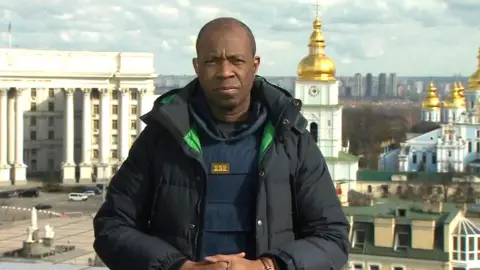Ukraine conflict: Your guide to understanding day 13
 Reuters
ReutersOn day 13 of the invasion, some civilians were finally able to leave areas under bombardment, after several days of ceasefire talks and failed evacuations.
A convoy of buses carrying mostly foreign students left the northern city of Sumy, and dozens left Irpin, near the capital Kyiv.
But human rights activists in Sumy said few local residents were willing to go, fearing that Russia would shell the humanitarian corridor that had been set up.
Anastasia, a 22-year-old medical student, faced a dilemma.
"Now I'm deciding whether or not to leave my family, because [my] grandparents decided not to go and my mother cannot leave them, and now I need to decide to leave them alone, or to stay."
An evacuation route was opened in Mariupol once again on Tuesday, only to fail again, with Ukrainian officials accused Russia of shelling the route.

Tuesday also saw coordinated efforts from the UK, US and EU to - in the words of President Joe Biden - hit "the main artery of Russia's economy": its energy sector.
The US has announced a complete ban on Russian oil, gas and coal imports, the UK is phasing out Russian oil by the end of the year, and and the EU is reducing its demand for Russian gas by two-thirds.
Russia's economy is heavily dependent on energy. It is the world's third-biggest oil producer, behind Saudi Arabia and the US.

A true hero, aged 11
 Slovak interior ministry
Slovak interior ministryAccording to the United Nations two million people have already left Ukraine as of Tuesday.
But among so many stories of courage in the face of huge suffering, one in particular stands out.
Days ago Hassan, 11, left his home in Zaporizhzhia, saying goodbye to his mother and elderly grandmother, to travel some 1,200km (750 miles) to the Slovakian border.
Carrying no more than two small bags, a passport and his relatives' phone number, he was finally helped across the border by customs officials.
They said he was a true hero and had won over everyone with his smile, his fearlessness and his determination.

Feeding the pigeons

While many Ukrainians are trying to leave, the BBC's Clive Myrie has been reflecting on those staying behind to defend their country.
Our correspondent, who is now in Romania, mentions a woman he saw in Kyiv risking bombs and missiles to feed the pigeons.
"For me, she represents strength and courage - the indomitability of an independent state, not the cowering fear of the colonised," she says.

Russian general killed, says Ukraine
 Russian defence ministry
Russian defence ministryUkrainian military sources have reported the death of a senior Russian commander in fighting near Kharkiv.
Maj-Gen Vitaly Gerasimov, chief of staff of the 41st Army, would be the second officer of this rank to be killed during the invasion - if confirmed by Russia.
The news came to light, apparently, via the interception of some phone calls between Russian intelligence officers.
An analyst suggests it is unusual for senior Russian officers to be so close to the front line, and that this has been necessitated by the intensity of the war.

Zelensky gets standing ovation from British MPs
Ukraine's President Volodymyr Zelensky received a standing ovation after addressing the UK's House of Commons on Wednesday afternoon.
The embattled president invoked the words of Winston Churchill, telling the gathered MPs: "We will not surrender, we will not lose, we will go to the end.
"We will fight at sea, we will fight in the air, we will protect our land.
"We will fight everywhere… and we will not surrender."
You can learn more about the man who went from a TV star to Ukraine's war time leader in the video below:

War in Ukraine: More coverage
